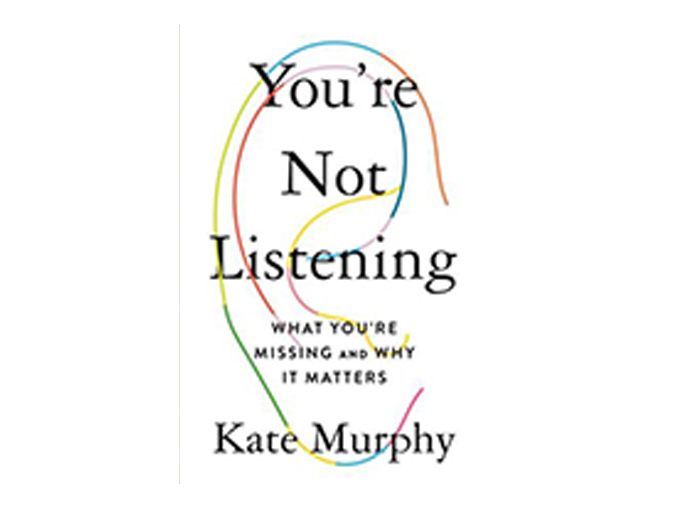You’re Not Listening: What You’re Missing and Why It Matters by Kate Murphy, Celadon Books, 2020
If you practice qualitative research and believe that good listening skills are important to your insights work, then this is a book you should read. As the author notes, “It is only by listening that we engage, understand, connect, empathize, and develop as human beings.” She believes listening is fundamental to success in personal, professional, and political relationships.
Kate Murphy is a journalist turned author, and therefore views herself as a professional listener. Even though she acknowledges that she too has some room for improvement, the tone of the book suggests that she believes the majority of others have acres of room for improvement, and this book is written with that need in mind.
Maybe she has a right to feel superior. In order to write this lecture on the importance and benefits of listening, Murphy spent almost two years exploring the available academic research related to listening, including the biomechanical and neurobiological processes, as well as the psychological and emotional effects.
The book provides insights from her academic research and from interviewing people who either study some aspect of listening, or whose job is listening intensive; from bartenders to psychotherapists and from hairdressers to hostage negotiators—she also included focus group moderators. There is a whole chapter dedicated to the listening skills of master moderators, and there is a reference to the fact that Murphy even attended a QRCA conference three years ago. This book is a potpourri of anecdotes and learning from all these sources.
Murphy believes that the inability to listen well starts early. Greater value is placed on what you project over what you absorb from listening. In high school there are classes on rhetoric and persuasion, and students are rewarded for success on the debating team. Social media allows everyone the opportunity to broadcast almost every thought and giving a TED Talk is considered an accolade. However, opportunities to learn careful listening are almost nonexistent. Murphy notes, however, that the ancient Greek philosopher Epictetus said, “Nature hath given men one tongue but two ears, that we may hear from others twice as much as we speak.” This notion drives the philosophy touted by this book.
If you read and agree with this book, you too will believe that how well you listen is so foundational to who you are, how you think, and what you believe, and that “to listen poorly, selectively, or not at all is to limit your understanding of the world and deprive yourself of becoming the best you can be.”
Based on her research, Murphy suggests that the lack of feeling heard has a negative health impact that is worse than smoking fourteen cigarettes a day. It has been linked to heart disease, stroke, dementia, and poor immune function, not to mention the epidemic of loneliness.
Being a good listener, on the other hand, can uncover information that is intensely personal by encouraging others to share confidences they were not planning to share. It can take you down paths of learning that are unexpected and memorable. It can create opportunities for deeper and more profound understanding that you would never achieve without listening carefully. It also makes those listened to feel really good.
These arguments for becoming a better listener are hard to counter—but listening to someone is “not as simple as it sounds.”
“Truly listening to someone is a skill many seem to have forgotten or perhaps never learned in the first place,” wrote Murphy.
To find out more about how you can improve your listening skills, I recommend you read this book and take heed of the many stories that Murphy shares in this easy and light-hearted read. She offers many suggestions for how to develop this essential skill.


Be the first to comment